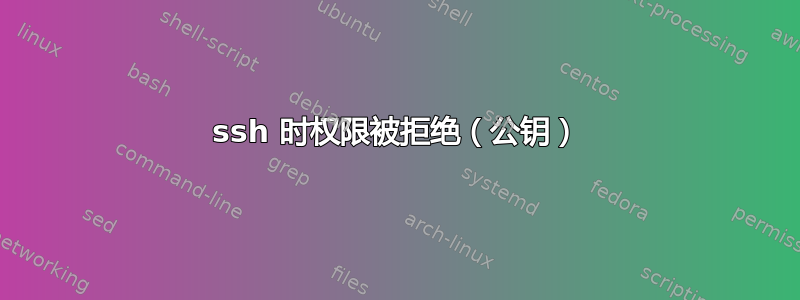
正如标题所说,我Permission denied (publickey)今天开始收到错误。在出现此问题之前,我今天早上能够登录,没有任何问题,而这似乎是在我同步一些我将要处理的文件后开始发生的。我同步的所有文件都与服务器配置或服务器上的认证密钥无关,它们是用 PHP 编写的文件,特定于我正在处理的 Web 应用程序。我已经能够通过 ssh 进入我的 Ubuntu 服务器一年多了,今天发生了一些事情,Permission denied (publickey).当我尝试通过 ssh 进入时,我不断收到错误。我尝试使用 ssh-copy-id 再次复制我的公钥,但收到一条错误消息
Received disconnect from 172.16.55.102 port 22:2: Too many authentication failures
我知道我的主计算机与服务器之间的连接肯定出现了故障,但我也不确定该如何处理此错误。我没有更改服务器上的任何配置,也没有从经过验证的密钥中删除任何内容(据我所知)。
我确保我的配置文件使用 IdentityFile 并确保密钥存在,这样它就不会一直尝试使用不同的密钥登录。
我没有其他方式进入服务器,并且设置服务器的基础设施人员不再在我所在的公司工作。还有其他方法可以解决这个问题吗?
编辑:这是我运行 ssh -vvvv 时的输出
debug1: Reading configuration data /home/dev123/.ssh/config
debug1: /home/dev123/.ssh/config line 2: Applying options for 172.16.55.*
debug1: Reading configuration data /etc/ssh/ssh_config
debug1: /etc/ssh/ssh_config line 19: Applying options for *
debug2: resolving "172.16.55.102" port 22
debug2: ssh_connect_direct: needpriv 0
debug1: Connecting to 172.16.55.102 [172.16.55.102] port 22.
debug1: Connection established.
debug1: identity file /home/dev123/.ssh/App_rsa type 0
debug1: key_load_public: No such file or directory
debug1: identity file /home/dev123/.ssh/App_rsa-cert type -1
debug1: identity file /home/dev123/.ssh/App_rsa type 0
debug1: key_load_public: No such file or directory
debug1: identity file /home/dev123/.ssh/App_rsa-cert type -1
debug1: Local version string SSH-2.0-OpenSSH_7.6p1 Ubuntu-4ubuntu0.3
debug1: Remote protocol version 2.0, remote software version OpenSSH_7.6p1
debug1: match: OpenSSH_7.6p1 pat OpenSSH* compat 0x04000000
debug2: fd 3 setting O_NONBLOCK
debug1: Authenticating to 172.16.55.102:22 as 'dev123'
debug3: hostkeys_foreach: reading file "/home/dev123/.ssh/known_hosts"
debug3: record_hostkey: found key type ECDSA in file /home/dev123/.ssh/known_hosts:1
debug3: load_hostkeys: loaded 1 keys from 172.16.55.102
debug3: order_hostkeyalgs: prefer hostkeyalgs: [email protected],[email protected],[email protected],ecdsa-sha2-nistp256,ecdsa-sha2-nistp384,ecdsa-sha2-nistp521
debug3: send packet: type 20
debug1: SSH2_MSG_KEXINIT sent
debug3: receive packet: type 20
debug1: SSH2_MSG_KEXINIT received
debug2: local client KEXINIT proposal
debug2: KEX algorithms: curve25519-sha256,[email protected],ecdh-sha2-nistp256,ecdh-sha2-nistp384,ecdh-sha2-nistp521,diffie-hellman-group-exchange-sha256,diffie-hellman-group16-sha512,diffie-hellman-group18-sha512,diffie-hellman-group-exchange-sha1,diffie-hellman-group14-sha256,diffie-hellman-group14-sha1,ext-info-c
debug2: host key algorithms: [email protected],[email protected],[email protected],ecdsa-sha2-nistp256,ecdsa-sha2-nistp384,ecdsa-sha2-nistp521,[email protected],[email protected],ssh-ed25519,rsa-sha2-512,rsa-sha2-256,ssh-rsa
debug2: ciphers ctos: [email protected],aes128-ctr,aes192-ctr,aes256-ctr,[email protected],[email protected]
debug2: ciphers stoc: [email protected],aes128-ctr,aes192-ctr,aes256-ctr,[email protected],[email protected]
debug2: MACs ctos: [email protected],[email protected],[email protected],[email protected],[email protected],[email protected],[email protected],hmac-sha2-256,hmac-sha2-512,hmac-sha1debug2: MACs stoc: [email protected],[email protected],[email protected],[email protected],[email protected],[email protected],[email protected],hmac-sha2-256,hmac-sha2-512,hmac-sha1debug2: compression ctos: none,[email protected],zlib
debug2: compression stoc: none,[email protected],zlib
debug2: languages ctos:
debug2: languages stoc:
debug2: first_kex_follows 0
debug2: reserved 0
debug2: peer server KEXINIT proposal
debug2: KEX algorithms: [email protected],diffie-hellman-group-exchange-sha256
debug2: host key algorithms: ssh-rsa,rsa-sha2-512,rsa-sha2-256,ecdsa-sha2-nistp256,ssh-ed25519
debug2: ciphers ctos: [email protected],[email protected],[email protected],aes256-ctr,aes192-ctr,aes128-ctr
debug2: ciphers stoc: [email protected],[email protected],[email protected],aes256-ctr,aes192-ctr,aes128-ctr
debug2: MACs ctos: [email protected],[email protected],[email protected],hmac-sha2-512,hmac-sha2-256
debug2: MACs stoc: [email protected],[email protected],[email protected],hmac-sha2-512,hmac-sha2-256
debug2: compression ctos: none,[email protected]
debug2: compression stoc: none,[email protected]
debug2: languages ctos:
debug2: languages stoc:
debug2: first_kex_follows 0
debug2: reserved 0
debug1: kex: algorithm: [email protected]
debug1: kex: host key algorithm: ecdsa-sha2-nistp256
debug1: kex: server->client cipher: [email protected] MAC: <implicit> compression: none
debug1: kex: client->server cipher: [email protected] MAC: <implicit> compression: none
debug3: send packet: type 30
debug1: expecting SSH2_MSG_KEX_ECDH_REPLY
debug3: receive packet: type 31
debug1: Server host key: ecdsa-sha2-nistp256 SHA256:mqOXsQayorR2q5TwY86GuZCuFyKNndx1LKByjDmf/Zk
debug3: hostkeys_foreach: reading file "/home/dev123/.ssh/known_hosts"
debug3: record_hostkey: found key type ECDSA in file /home/dev123/.ssh/known_hosts:1
debug3: load_hostkeys: loaded 1 keys from 172.16.55.102
debug1: Host '172.16.55.102' is known and matches the ECDSA host key.
debug1: Found key in /home/dev123/.ssh/known_hosts:1
debug3: send packet: type 21
debug2: set_newkeys: mode 1
debug1: rekey after 134217728 blocks
debug1: SSH2_MSG_NEWKEYS sent
debug1: expecting SSH2_MSG_NEWKEYS
debug3: receive packet: type 21
debug1: SSH2_MSG_NEWKEYS received
debug2: set_newkeys: mode 0
debug1: rekey after 134217728 blocks
debug2: key: /home/dev123/.ssh/App_rsa (0x55c5a86eb7a0), explicit
debug2: key: /home/dev123/.ssh/App_rsa (0x55c5a86ebb90), explicit
debug3: send packet: type 5
debug3: receive packet: type 7
debug1: SSH2_MSG_EXT_INFO received
debug1: kex_input_ext_info: server-sig-algs=<ssh-ed25519,ssh-rsa,rsa-sha2-256,rsa-sha2-512,ssh-dss,ecdsa-sha2-nistp256,ecdsa-sha2-nistp384,ecdsa-sha2-nistp521>
debug3: receive packet: type 6
debug2: service_accept: ssh-userauth
debug1: SSH2_MSG_SERVICE_ACCEPT received
debug3: send packet: type 50
debug3: receive packet: type 53
debug3: input_userauth_banner
答案1
我想为将来可能偶然发现这篇文章的任何人回答我的问题。问题最终是,在我运行文件同步脚本时,服务器上的 .ssh 目录不知何故被损坏或删除了。我仍然不完全确定具体是怎么回事,也无法从日志中确定那天出了什么问题。幸运的是,我所在公司的首席开发人员也在我的服务器上有一个帐户,他能够将我的公钥放回原位,并重置我的登录尝试,现在我可以再次登录了。据推测,我收到“身份验证失败次数过多”消息的原因是由于尝试 ssh 登录时我的服务器上不存在密钥,然后阻止了我的帐户。


